10 Powerful Strategies to Implement B2B Chatbots
B2B chatbots enhance business operations by automating customer service, streamlining sales processes and providing 24/7 support.

B2B chatbots enhance business operations by automating customer service, streamlining sales processes and providing 24/7 support.

Failing to adapt to modern customer experience expectations in the digital-first business landscape can be disastrous. According to a report, 58% of the B2B brands use chatbots more actively than the B2C brands. It is understandable since chatbots are a helpful tool for lead generation and nurturing, which is an integral part of a B2B business.
Well-designed B2B chatbots can be the solution to boost operational efficiency and improve customer satisfaction. Discover how these intelligent tools can streamline processes, optimize interactions and drive greater business success by providing timely support.
B2B chatbots refer to an AI-powered conversational interface designed to facilitate and automate interactions. They are typically integrated into messaging platforms, websites, or other knowledge management systems to automate conversations. The insights and data gathered by them can provide valuable information about customer preferences, pain points and market trends.
Key objectives:
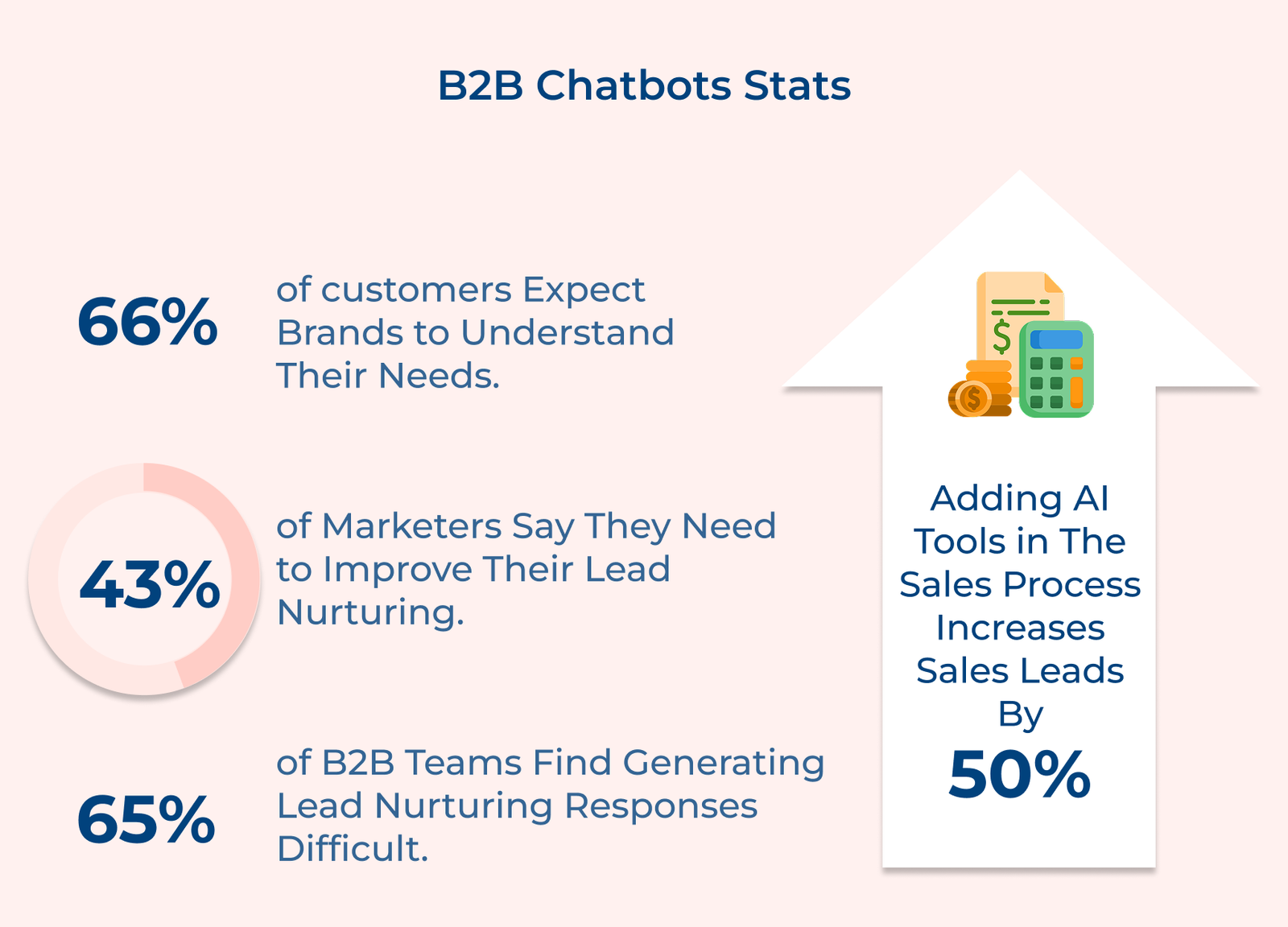
B2b bots can have a significant impact on both revenue and profitability in below ways:
Unlock the power of B2B chatbots and understand how they enhance efficiency, boost customer interactions and drive growth through smart automation.
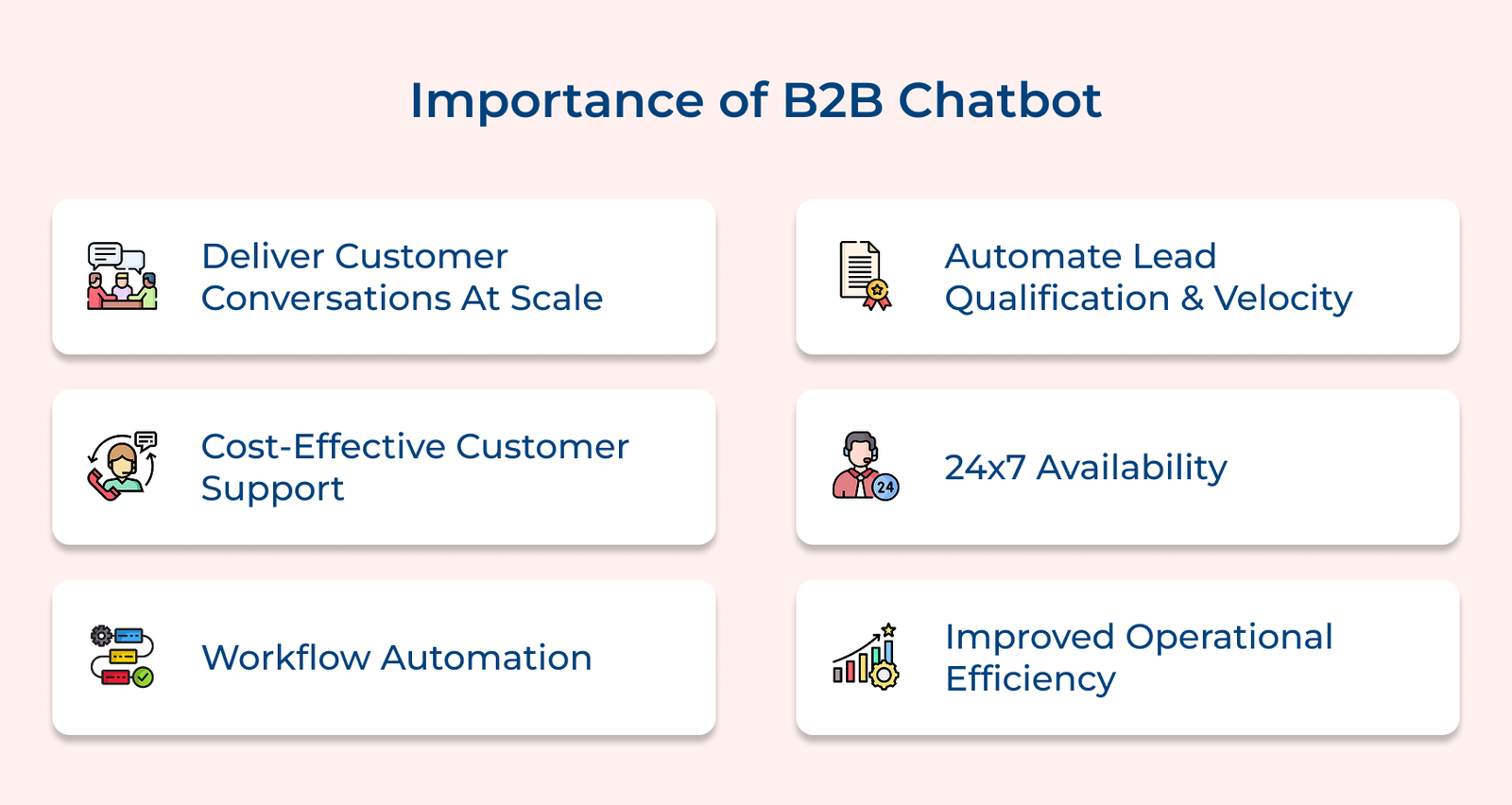
1. Deliver customer conversations at scale: Businesses can engage with customers at scale, providing personalized and contextual interactions. They can handle a high volume of inquiries and conversations simultaneously. It ensures that no customer inquiry goes unanswered, even during peak periods.
2. Automate lead qualification and velocity: B2B bots can be powerful tools for lead generation and qualification. Engaging with potential customers through chatbots can gather relevant information. 36% of companies turn to the chatbot market to improve lead generation.
3. Cost-Effective customer support: Traditional customer support channels can be resource-intensive and costly. The bots offer a cost-effective alternative by automating routine inquiries and reducing the workload. Businesses can scale their support efforts efficiently without compromising quality or response times.
4. 24×7 Availability: B2b chatbots operate around the clock, providing constant availability and instant responses to inquiries regardless of time zones or business hours. It ensures that critical information or support is accessible at all times, establishing better relationships and trust with professional counterparts.
5. Workflow automation: B2b bots can be integrated with existing enterprise systems, enabling seamless data flow or process automation across multiple departments and functions. The automation streamlines workflows, eliminates manual tasks and reduces the risk of human errors.
6. Improved operational efficiency: B2b AI chatbots can significantly enhance operational efficiency across various business processes. It automates routine tasks providing instant responses and streamlining workflows. The human resources can focus on more strategic and high-value activities.
Here we will explore some of the most effective and innovative ways that businesses are implementing B2b AI chatbots to improve their operations.
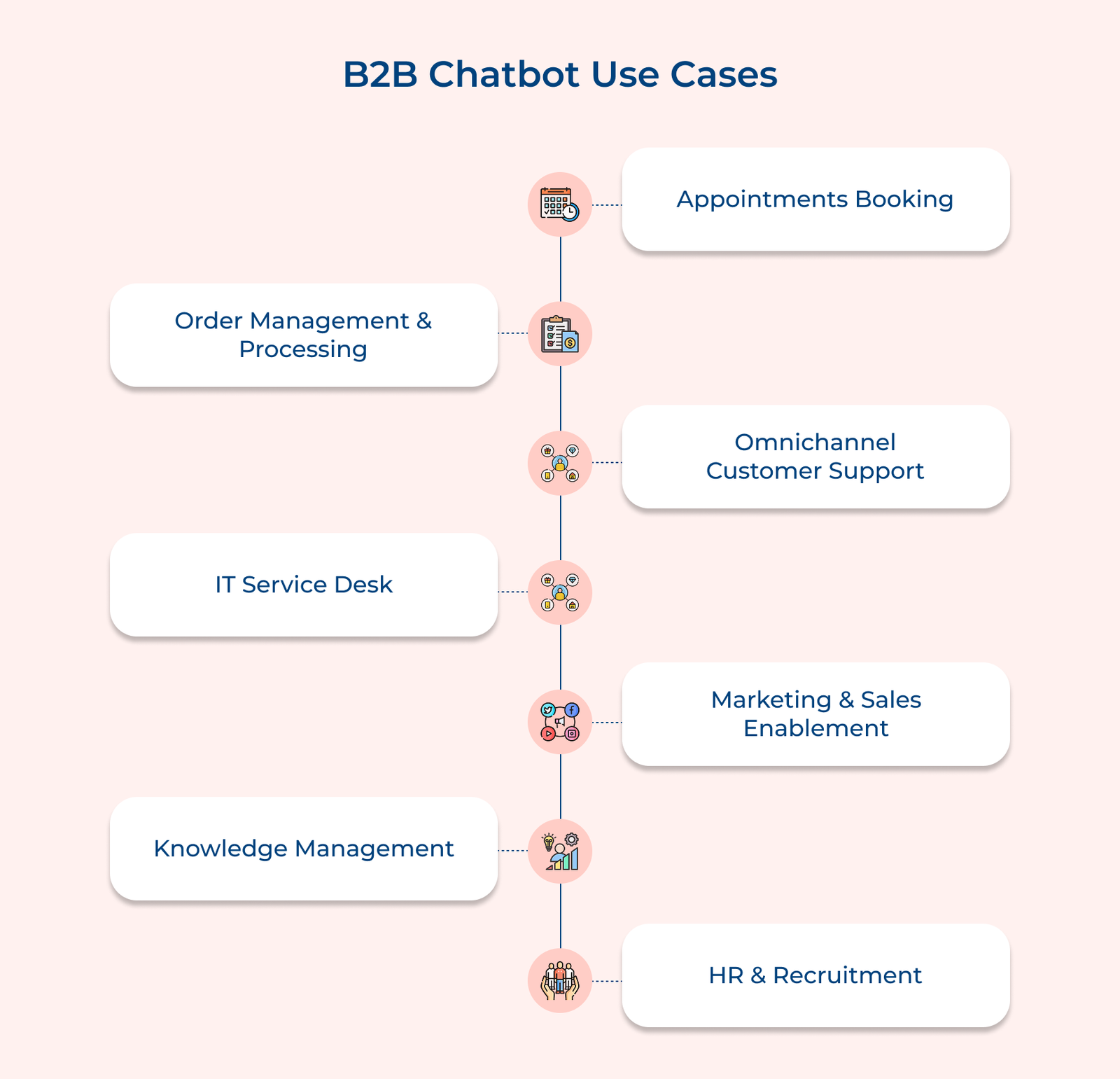
B2B organizations often rely on scheduling meetings and consultations with clients or prospects. B2B bots can streamline this process by allowing users to book appointments directly through a conversational interface on the website. They can seamlessly integrate with calendar apps reducing back-and-forth communication, ensuring efficient scheduling.
B2B AI chatbots can guide customers through product catalogs, facilitate payment processes and provide real-time order tracking. The whole process not only enhances the customer experience but also reduces the workload on sales and customer service teams.
B2B customers expect consistent support across various channels, including email, phone, live chat and social media. The bots can provide 24/7 customer support, handle routine inquiries, troubleshoot issues and offer self-service options. Delivering a unified experience across these platforms not only enhances customer satisfaction but also strengthens long-term relationships.
B2B bots can act as highly efficient virtual IT service desk assistants, offering instant support by handling routine queries, troubleshooting issues and guiding employees through self-service options. It helps businesses significantly reduce the workload on IT teams and improve response times.
B2B organizations often have extensive knowledge bases and documentation that employees need to access or navigate. B2B AI chatbots can act as virtual knowledge assistants for businesses. Providing access to relevant information or guiding users through complex procedures makes knowledge sharing within the organization more accessible.
B2B bots can nurture leads, provide product information, share pricing details and facilitate demonstrations or trials. The tools can assist with lead generation and qualification, ensuring the sales teams focus on high-quality opportunities. 36% of marketers are alread using AI chatbots for generating and nurturing leads.
B2B companies can leverage B2B AI chatbots for various HR and recruitment tasks such as assisting candidates in inquiring about job openings. They can also support onboarding processes, providing new hires with relevant information and answering common questions.
Below we have covered everything a brand needs to know to successfully integrate B2B bots into its operations to maximize the benefit of the tool.
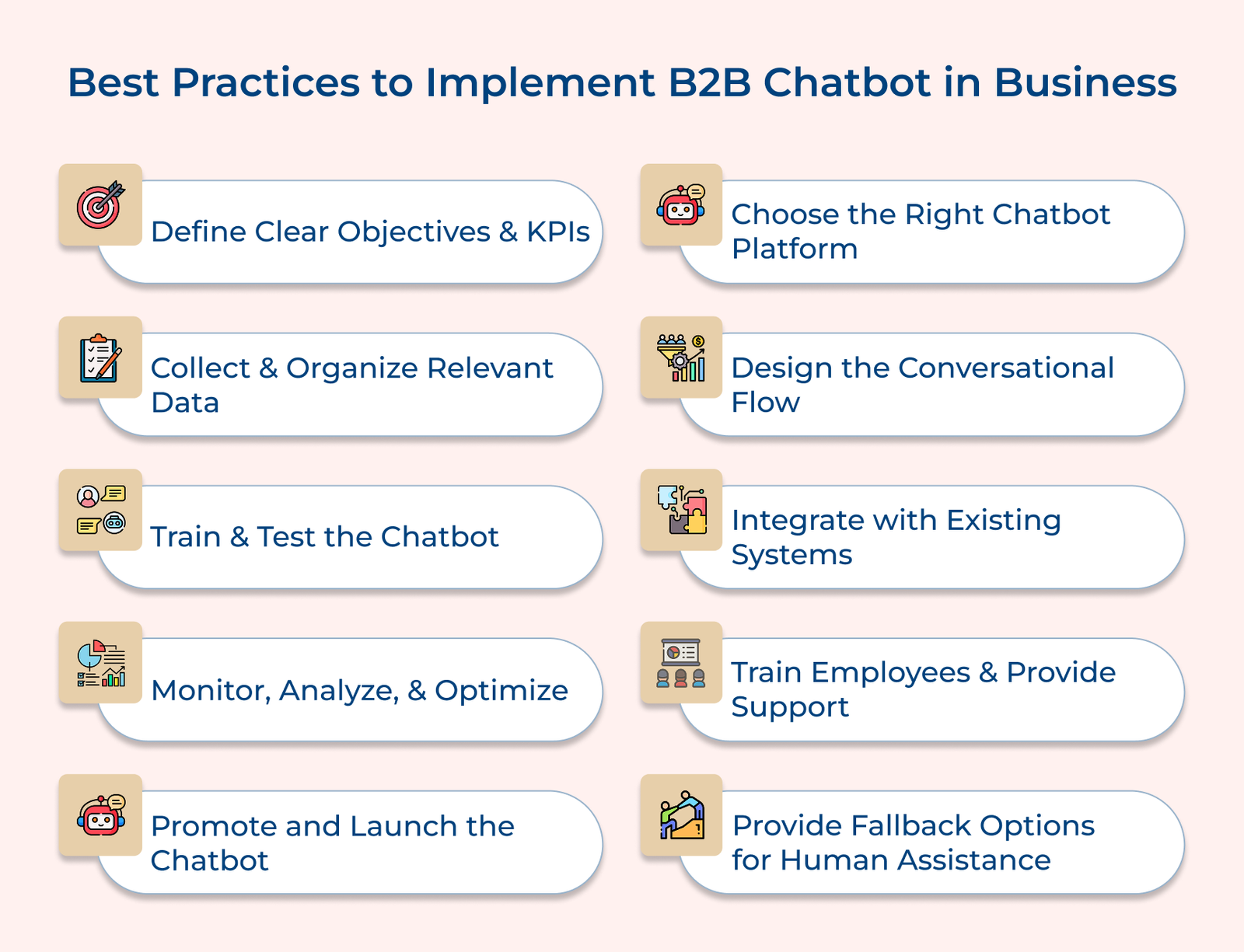
Defining clear objectives and key performance indicators (KPIs) is a critical first step when implementing B2B chatbots. Without well-defined goals or metrics, it becomes challenging to measure the chatbot’s effectiveness and align its capabilities with business objectives.
Establishing clear objectives ensures the resources are allocated effectively and the chatbot’s development is aligned with organizational priorities. It also enables data-driven decision-making by providing a benchmark against which to evaluate the chatbot’s impact.
Best practices:
When choosing the right chatbot platform to implement B2B chatbots, it’s essential to evaluate different options and providers based on key criteria. Here are some critical factors to consider:
Data plays a pivotal role in shaping the B2b AI chatbot’s capabilities and ensuring its relevance to the target audience. Well-organized or up-to-date data enables B2B bots to understand user queries, retrieve relevant information and provide accurate responses.
Begin by gathering existing customer data, product information and knowledge base content from various sources within the organization. It will serve as the foundation for training the chatbot and ensuring it provides accurate responses.
Pro tips:
A well-designed conversational flow represents the logical structure or sequence of interactions between the chatbot and users. It involves carefully planning each step of the dialogue to ensure it meets user needs, addresses their queries effectively and maintains engagement throughout the interaction.
An optimized conversational flow can lead to increased customer satisfaction, higher task completion rates and improved operational efficiency. A poorly designed flow can result in user frustration, abandoned conversations and a negative impact on the overall chatbot experience.
Best practices:
Chatbot training ensures that it is equipped with the necessary knowledge and capabilities to handle user queries effectively. The process involves feeding the chatbot with relevant information, refining its responses and continuously testing its performance in real-world scenarios.
Well-trained B2b AI chatbots are better equipped to handle complex queries, provide contextual responses and adapt to evolving user needs. Inadequate training can lead to misunderstandings, incorrect responses and frustrating user experiences.
Pro tips::
Connect the chatbot with essential business applications such as CRM, ERP, helpdesk software, knowledge bases and internal wikis. The integration ensures the data flow is seamless and processes are effectively automated. It enables the chatbot to access information across multiple platforms.
Best practices:
Create awareness about the new chatbot through various channels such as email campaigns, website announcements and customer communications. Make sure to highlight the benefits and use cases to encourage adoption amongst the users.
Pro tips:
Measuring the chatbot’s performance is crucial for ensuring its long-term success and effectiveness. Based on the insights gained from performance metrics, continuously refine and update the chatbot’s knowledge base.
Best practices:
Even the most advanced chatbots may encounter complex or sensitive situations that require human intervention. Offering a seamless transition to human support enhances the overall customer experience and establishes trust in the system.
Organizations can leverage the efficiency of chatbots and offer a human touch while demonstrating a commitment to personalized customer service. The approach ensures that even as chatbots handle routine queries and tasks, customers always have the option to connect with a human representative when needed.
How to implement:
Educating employees on the chatbot’s capabilities and limitations is crucial to ensure effective utilization or managing customer expectations. Provide hands-on training sessions, tutorials and clear communication channels to address employee queries or concerns.
Brands can maximize the benefits of B2B chatbots while establishing a culture of continuous improvement and customer-centric service delivery. It not only optimizes the functionality of your chatbots but also drives a more effective and customer-focused approach across the business.
How to implement:
Implementing and managing B2B AI chatbots comes with several challenges that businesses must address to ensure successful adoption or effective performance.

1. Data privacy and security concerns: Ensuring data privacy and security is crucial to maintaining trust and complying with regulatory requirements. Businesses must implement robust data protection measures including secure data storage, encryption, access controls and regular security audits.
2. Integration with complex business processes: Integrating chatbots with these complex business processes can be challenging as it requires careful planning and coordination across multiple departments or stakeholders. Businesses must ensure seamless integration with existing systems such as CRM, ERP and other enterprise applications.
3. Training and maintaining chatbot knowledge: B2B chatbots require extensive training to acquire domain-specific knowledge and respond accurately to complex queries. There should be dedicated resources to continuously train and refine the chatbot’s capabilities to ensure its relevance.
4. Managing user expectations and limitations: Managing user expectations and communicating the chatbot’s capabilities is quite essential. It prevents frustration and ensures a positive user experience. Businesses should provide clear guidelines and fallback options for human assistance.
5. Balancing automation and human intervention: Automation can improve efficiency or reduce costs, certain situations may require human expertise and judgment. Make sure to establish clear protocols for when and how to escalate complex or sensitive issues to human agents.
The need for efficient communication and streamlined operations becomes paramount as B2B organizations continue to grow. Traditional methods often fall short and are inefficient when the business operations are spread across the globe. It is where the power of leveraging technology and tools comes into play.
B2B chatbots emerge as intelligent and scalable alternatives, offering virtual assistants capable of handling a wide range of business functions. They can operate around the clock ensuring that customers and partners receive prompt assistance regardless of time zones or business hours. Their ability to seamlessly integrate with existing systems and platforms further enhances their value.
Interactive chatbots can enhance B2B consumer engagement by providing personalized experiences and guiding users through the sales process. They offer real-time support, gather valuable data for targeted marketing and streamline communication for a seamless customer experience. Leveraging B2B bots allows B2B businesses to build stronger relationships with their customers and drive higher engagement levels.
Businesses are increasingly adopting B2B bots as part of their sales and customer service strategies. They offer 24/7 customer support, improved efficiency, personalized interactions and cost savings. Chatbots can handle a large volume of inquiries simultaneously, freeing up human agents to focus on more complex tasks. B2B chatbots improve customer satisfaction and drive business growth.
B2B chatbots are AI-powered tools that engage with potential business clients on messaging platforms. They can answer common questions, provide information on products or services, schedule appointments and even assist with transactions. Using natural language processing chatbots can understand and respond to queries in real-time.
Training B2B chatbots involves programming specific responses, understanding user queries and providing accurate information. Begin by analyzing customer interactions and creating a database of frequently asked questions. Use machine learning algorithms to improve responses over time. Regularly update or refine the chatbot’s algorithms to ensure it remains an effective tool for B2B communication.
The future of B2B chatbots is promising, with more businesses turning to AI-driven solutions to streamline customer interactions. Chatbots will become more sophisticated offering personalized responses and data-driven insights. Integration with CRM systems and other tools will enhance efficiency. It makes chatbots an essential tool for B2B sales and customer service in the coming years.

Market better, sell faster and support smarter with Veemo’s Conversation Customer Engagement suite of products.
Unify all your customer data in one platform to deliver contextual responses. Get a 360 degree view of the customer lifecycle without switching tools.
Connect with the tools you love to reduce manual activities and sync your business workflows for a seamless experience.
 https://veemo.io/wp-content/uploads/2025/12/customer-connection.png
1256
2400
Indrasish Singha
https://veemo.io/wp-content/uploads/2024/11/veemo.svg
Indrasish Singha2026-02-06 09:11:372026-01-19 09:14:05What is Customer Connection: Mistakes, Metrics & Examples
https://veemo.io/wp-content/uploads/2025/12/customer-connection.png
1256
2400
Indrasish Singha
https://veemo.io/wp-content/uploads/2024/11/veemo.svg
Indrasish Singha2026-02-06 09:11:372026-01-19 09:14:05What is Customer Connection: Mistakes, Metrics & Examples https://veemo.io/wp-content/uploads/2025/12/complaint-management.png
1256
2400
Indrasish Singha
https://veemo.io/wp-content/uploads/2024/11/veemo.svg
Indrasish Singha2026-02-03 09:04:022026-01-19 09:10:02What is Complaint Management? Importance, Key Steps & Strategies
https://veemo.io/wp-content/uploads/2025/12/complaint-management.png
1256
2400
Indrasish Singha
https://veemo.io/wp-content/uploads/2024/11/veemo.svg
Indrasish Singha2026-02-03 09:04:022026-01-19 09:10:02What is Complaint Management? Importance, Key Steps & Strategies https://veemo.io/wp-content/uploads/2025/12/AI-Self-Service.png
1256
2400
Indrasish Singha
https://veemo.io/wp-content/uploads/2024/11/veemo.svg
Indrasish Singha2026-01-26 09:52:482026-01-13 10:17:07What is AI Self Service? Benefits, Key Metrics and Best Practices
https://veemo.io/wp-content/uploads/2025/12/AI-Self-Service.png
1256
2400
Indrasish Singha
https://veemo.io/wp-content/uploads/2024/11/veemo.svg
Indrasish Singha2026-01-26 09:52:482026-01-13 10:17:07What is AI Self Service? Benefits, Key Metrics and Best PracticesGrow Customer Relationships and stronger team collaboration with our range of products across the Conversational Engagement Suite.

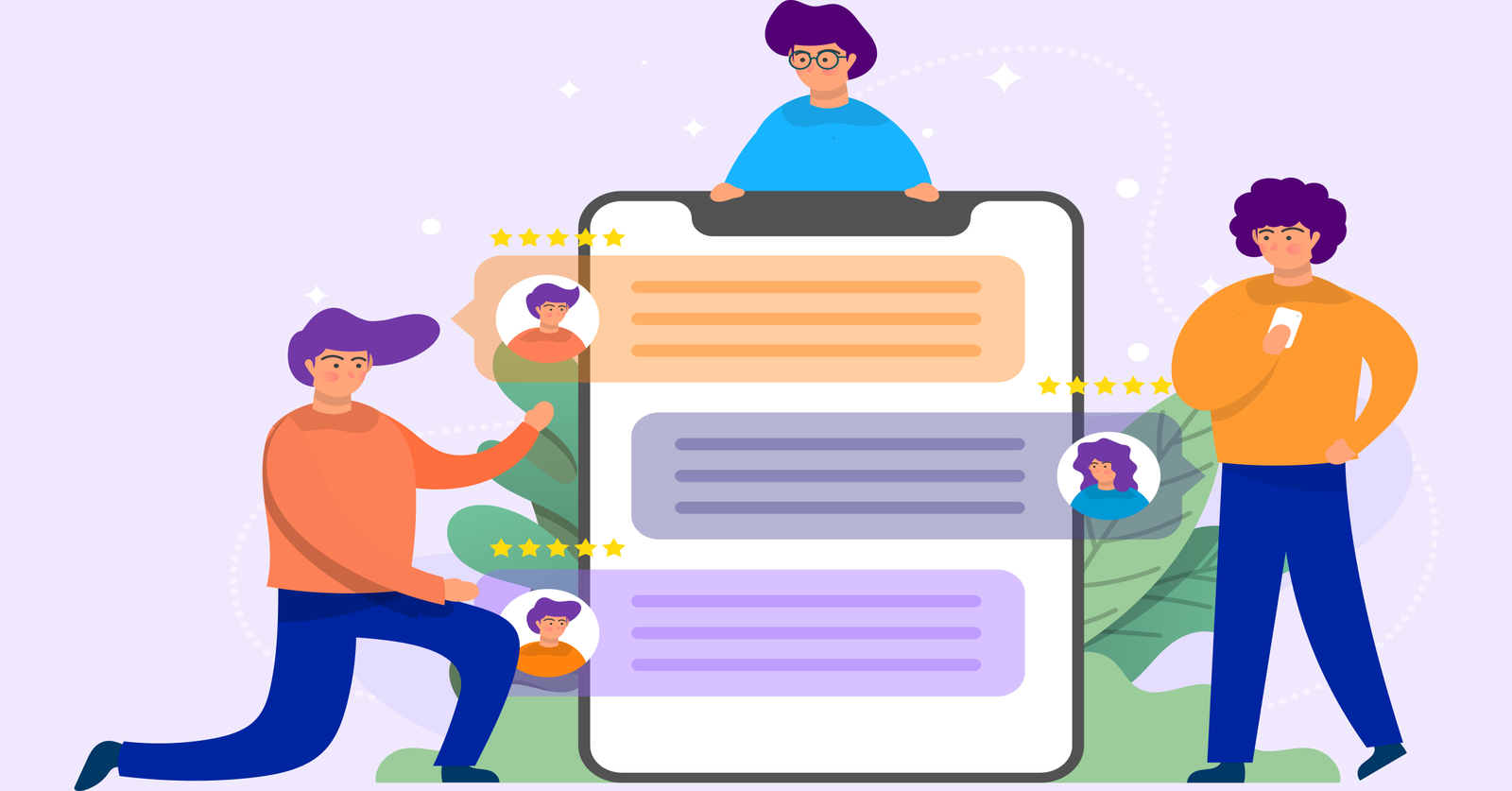 50+ Live Chat Scripts & Examples for Customer Interactions
Scroll to top
50+ Live Chat Scripts & Examples for Customer Interactions
Scroll to top